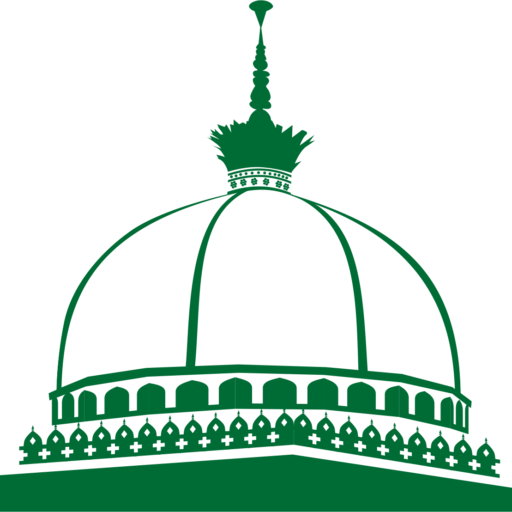Gharibnawaz(R.A) >Birth And Early Life >Khawaja Sahib’s Genealogy
Hazrat Khawaja Muinuddin Chishty was one of the descendants of the illustrious family of Hazrat Ali, the son-in-law and cousin of the Holy Prophet Mohammed (May peace of God be on him). His father Syed Ghiyasuddin Hasan was a very pious personality and a well to do and influential gentleman. His mother, Syeda Bibi Ummul-wara alias Babi Mah-e-Noor was the daughter of Syed Daud. While Khawaja Muinuddin’s paternal genealogy is traced from Hazrat Imam Husain, the younger son of Hazrat Ali Karam Allah Wajahu, his maternal genealogy is traced from Hazrat Imam Hasan, the elder son of Hazrat Ali.
Childhood
According to historians, Khwaja Muinuddin Chishty even during his childhood gave early promise of his rare piety and sacrifice for others. Whenever any woman with a baby came to see his mother and if the baby cried for feeding,”the infant saint of the future” used to make a sign to his mother to feed the crying baby from her own breast. When his mother did this, the spectacle pleased the little Muinuddin very much. At the age of 3 or 4 he used to share his own food with his playmates.
Paternal Genealogy
Khawaja Muinuddin Hasan Chishty, son of Khawaja Syed Ghyasuddin Hasan, son of Syed Ahmed Muddin Tahir, son of Syed Khawaja Abdul Aziz Husain, son of Syed Imam Mohammed Mehdi, son of Syed Imam Hasan Askari, son of Imam Ali Naqi, son of Syed Imam Mohammed Taqi, son of Imam Ali Musi Raza, son of Imam Musi Kazim Raza, son of Imam Mohammed Jafar Sadiq, son of Imam Mohammed Baqar, son of Hazrat Syed Imam Zain-ul-Abideen, son of Syed-ul-Shohoda Syed Imam Husain, son of Amir-ul-Momineen Hazrat Ali, son-in-law of the Holy Prophet Mohammed.
Maternal Genealogy
Syeda Bidi Mah-e-Noor, daughter of Syed Daud, son of Hazrat Abdulla, son of Syed Zahid, son of Syed Mooris, son of Syed Daud I, son of Syedna Moosa, son of Syedna Abdulla Mahaz, son of Syedna Hasan Musa, son of Syedna Hazrat Imam Hasan, son of Syedna Hazrat Ali Karam Allah Wajahu.
Arrival And Preaching
Hazrat Khawaja Moinuddin Chishty arrived in Ajmer at the age of 52 in 587 AH or 1191 AD on his divine mission, unique in the annals of Islam and also in the history of India. As we have seen, for the success of his grand mission he had already been suitably trained by his Pir-o-Murshid Hazrat Khawaja Usman Harooni and divinely equipped by the blessings of the Holy Prophet Mohammed. He was thus an apostle of God dedicated to the cause of Truth which “always and invariably prevails though in the long run.” His only armour for the success of his great mission was that greatest invisible power that pervades and sustains the whole universe.
Greatest Preacher Of Islam In India
It is a historic fact that Hazrat Khawaja Moinuddin Chishty was the greatest preacher and founder of Islam in India. It was he who laid the real foundation of Islam in India by his peaceful mission and unparalleled forbearance. He brought the message of ‘Universal Love and Peace’ and paved the way for his succeeding Khalifas for the peaceful propagation of Islam in this country without any compulsion whatsoever in the true spirit of the Holy Quran which says, “Let there be no compulsion in religion. Wilt thou compel men to become believers? No soul can believe but by the persuasion of God.” Khawaja Moinuddin followed this dictum through out his mission. Before his arrival, Muslims in India were in a most negligible minority. His piety and sympathetic preaching made a profound impression upon all he came across. did wonders with his peaceful preaching of Islam in this country. He did not bring any armies with him but came with only a few companions; he feared none on earth except Allah. He did not come out to conquer the wealth of India, he came out to endear and win the hearts of Indian people by free conviction in order to put them on the right path of “Truth and Love” and thus give them happiness and prosperity in life and salvation after death.
Married Life
How could a great Sufi saint, who had renounced all worldly pleasures in his early ‘teens’, ever think of a married life? Yet Khawaja Moinuddin Chishty was obliged to marry twice at a very advanced age under Islamic Shariat at the commandment of the Holy Prophet. Throughout his blooming youth he was devoutly engaged in his difficult spiritual training under his Pir-o-Murshid, Hazrat Khawaja Usman Harooni, as a whole time devotee. The Sufis, leading a strictly austere and religious life, generally denied matrimony; their only object of life being complete renunciation and staunch dedication to God in the service of Islam and humanity.
First Marriage
When he had settled down in Ajmer, the Khawaja Sahib had a special reminder about his marriage through a ‘Basharat’ (prophetic dream) from the Holy prophet sometime in 590 AH or 1193 AD. The Prophet said, “O Moinuddin, You are a great preceptor of our religion. You should not depart from our ‘sunnah’ (meaning marriage which is incumbent upon every Muslim under the laws of Shariat). Coincidentally that very night Malik-a-Khitab devotee of Hazrat Khawaja Sahib gave his sister Bibi Ummutulla to marry him.
Second Marriage
Once again the Khawaja Sahib was asked to marry (in 620 AH or 1223 AD) Bibi Asmat, daughter of Syed Wajihuddin Mashhadi who was the commissioner of Ajmer since Qutubuddin Aibak’s regime. Maulana Ahmed, who was a Khadim (attendant) of Hazrat Khawaja Sahib, states that Syed Wajihuddin Mashadi had a grown up daughter. He was worried about her marriage, as no suitable match was available. One night Hazrat Imam Jafar gave him this, `basharat’, `O Son, it is the commandment of the Holy Prophet that you should marry your daughter to Sheikh Moinuddin.’ Syed Wajihuddin mentioned this to Hazrat Khawaja Sahib and he replied, “Although I am now too old to marry, but the commandment of the Holy Prophet must be obeyed. I accept this relation.” And so the Khawaja Sahib married a second time.
Children From Both Wives
It is an irrefutable fact that Khawaja Moinuddin Chishty had three sons and one daughter, viz. Khawaja Fakhruddin, Khawaja Hissamuddin, Khawaja Ziaddin Abu Sayeed and Bibi Hafiza Jamal. It is generally agreed that Khawaja Ziauddin Abu Sayeed was born of Bibi Asmat while Khawaja Fakhruddin, Khawaja Hissammuddin and Bibi Hafiza Jamal from Bibi Ummatulla Hazrat Syed Mahmud Gesudraz of Gulbarga and his group of Sufis are, however, of the opinion that both the later sons were also born of Bibi Asmat, but Maulana Shamsuddin Taher and his group maintain that they were born of Bibi Ummatulla.
Khawaja Sahib’s Sons
Khawaja Fakhruddin, the eldest son of Hazrat Khawaja Sahib, was a great dervish and followed strictly in the footsteps of his illustrious father. He spent most of his time in spiritual development with Hazrat Nizamuddin Aulia of Delhi who was himself a great and well-known Sufi dervish. He adopted agriculture as his profession and lived in a village (Mandal) near Ajmer. He is reported to have died in 1265 AD and is buried at Sarwar, 37 miles from Ajmer on the Ajmer-Kekri Road which is an attraction to hundreds of pilgrims during his Urs every year Khawaja Hissammuddin, the second son of Hazrat Sahib, is reported to have disappeared in his early age. All that is known of him is that he died in 1255 AD. He is said to have acquired the stage of an “abdaal” (certain holy person by whom God continues the world in existence, according to Islamic belief.) Khawaja Ziauddin Abu Sayeed, the 3rd son of Hazrat Khawaja Sahib, left two sons of whom nothing is further known. He was buried in the precincts of Khawaja Sahib’s Dargah at Ajmer and died at the age of 50. The Khawaja Sahib’s only daughter, Bibi Hafiza Jamal was a very pious lady and had leaned Quran by heart at the age of 7. She was married to Sheikh Raziuddin son of Sultan-ul-Tarikin Hazrat Khawaja Hameed-ud-din Nagauri; a saintly dervish who lies buried at Nagaur in Jodhpur district. She was buried in a tomb on the south of Khawaja Sahib’s shrine at Ajmer. Both Bibi Asmat and bibi Ummatulla are also buried in the precincts of the Dargah of Khawaja Sahib at Ajmer.
Death Of Khawaja Saheb
The passing away of Hazrat Khawaja Moinuddin (may peace of god be upon his soul) from this world to the next which took place on 6th of Rajab 633 AH (1233 AD) at the ripe age of 97 was also one of the greatest mysteries of his life. It goes without saying that by virtue of his divine life Khawaja Moinuddin is immortal. In the past 750 years, millions of people of all classes and faiths inspired by his love and pious preaching, are attracted to his shrine from all over the world to pay their loving homage and receive his ungainly blessings to solve their problems. Such a devotion has never been offered to the tomb of any the mightiest monarchs of the world and it is a rare distinction in the history of Islam and Sufism. The life and mission of Hazrat Khawaja Moinuddin have been of an exceptional character as compared to any other saints of India. His simple teachings penetrated even stony hearts, his affectionate looks tamed his fiercest enemies, his matchless piety and blessings knew no distinction and his spiritual amazed and defied his bitterest adversaries who came to harm him but were compelled to embrace Isalm and become his devotees for the rest of their lives. These exceedingly rare gifts are bestowed by the Almighty God only upon his “chosen few” whom He deputes to reform mankind whenever is goes astray from the right path of Truth.
Mystery Of Khawaja Saheb’s Death
On the night of 5th of Rajab 634 AH the great saint as usual, retired to his cell after the ‘Isha’ prayer (the prescribed time of this prayer is between 8-30 p.m. and midnight) and closed the door, instructing his attending devotees not to disturb him that night. They stayed away but heard a noise of something like ‘wajd’ (ecstasy) throughout that particular night. In the early hours of the morning, this noise however ceased. When as usual, the door of the cell did not open at the time of the morning prayers (5 to 6am), anxiety was felt all round and ultimately it was forced open by Khawaja Saheb’s devotees. Their great saint had relinquished his mortal remains and the following sentence in Arabic was radiantly glittering on his forehead: “Haaza Habib-Allah Mata Fee Hoob-Allah” (He is God’s beloved and he died in God’s love).


